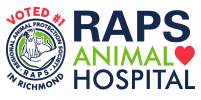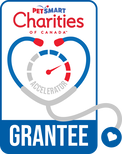|
Most people (hopefully) by now know how dangerous it is to leave a dog in a hot car for even a few minutes. But dogs and cats can face heat-related dangers even around your home. There are some common warning signs about dehydration and preventative measures that are easy to take that can ensure your pet’s happiness and health in the summer sun. As in humans, water is an irreplaceable component of body function, helping to lubricate joints, regulate body temperature, transport nutrients and flush waste. Dehydration is a result of a loss of fluid levels due to either increased fluid loss or reduced intake of water. It can be a result of overheating in hot weather or through vomiting or diarrhea, particularly in puppies. Water can be lost through urinating and defecation, but also through panting, breathing and even evaporation through the paws. Common symptoms of dehydration are sunken eyes, lethargy, loss of appetite, dry mouth, nose and gums, and depression. Dehydration may be a sign of an underlying condition, such as kidney disorders, infectious diseases or cancer. Elderly, pregnant or nursing dogs may also experience dehydration, as can dogs with diabetes. An easy test that can indicate dehydration is gently lifting the skin on the back of a dog's neck or between the shoulder blades. The skin should return to a normal position immediately (no more than one second) if the dog is properly hydrated. If dehydration is present, the skin may not have the elasticity to return to its normal position. (The elasticity test may not be effective on overweight dogs and it may be difficult on “wrinkly” dogs, like Shar-Peis … in such cases, practice the test when you know your dog is hydrated so you can tell the difference in the event of dehydration. Even so, many signs of dehydration are not identifiable to the untrained observer. Any suspicion of dehydration should be referred to a veterinarian for diagnosis and treatment. Treating dehydration requires more than providing a bowl of water. It is necessary to replace electrolytes and a veterinarian can provide fluids to balance the system and return to healthy hydration levels. Veterinarians can quickly alleviate the problem with intravenous or subcutaneous fluids and determine if there is an underlying cause of the problem. To prevent dehydration, you should:
There has been a great deal of education around dogs in hot cars. This summer, we should also be keeping a close eye on our pets’ in and around the house, seeing how much water they are going through and whether they show any symptoms of dehydration. Have a great, safe summer!
0 Comments
|
AuthorWrite something about yourself. No need to be fancy, just an overview. Archives
January 2024
Categories |

 RSS Feed
RSS Feed


